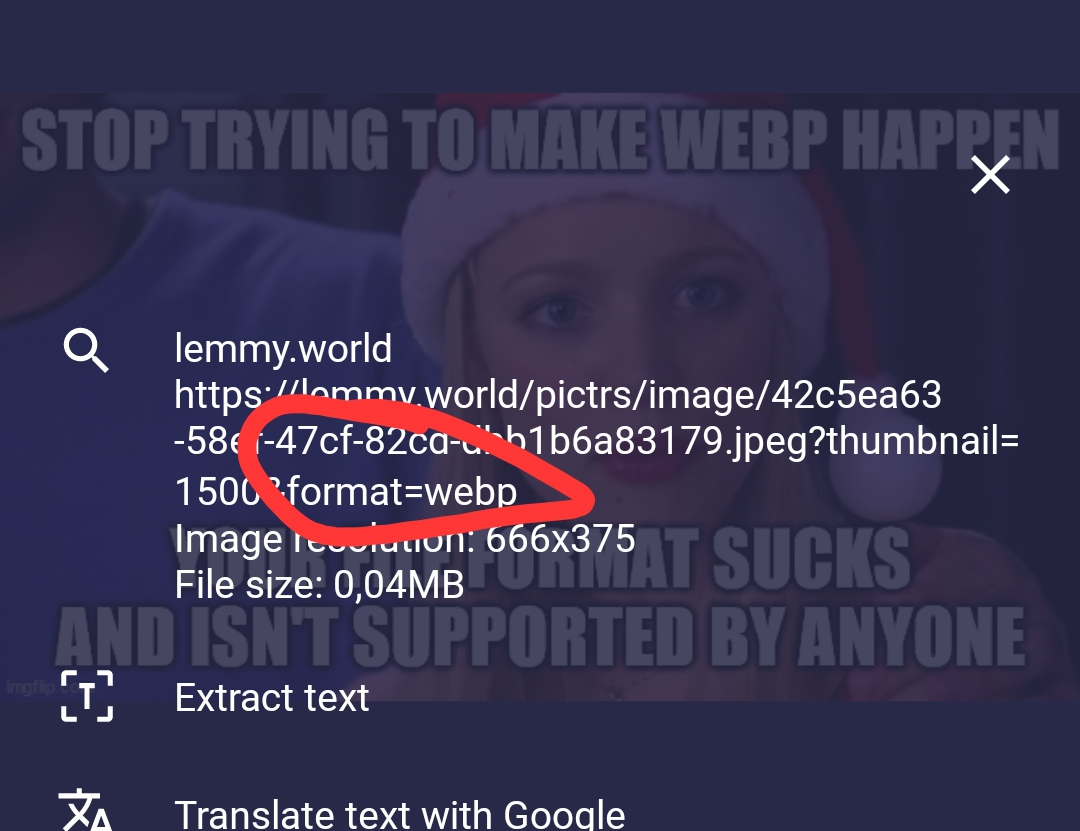Webp
Developed by google, for google products.
Not guaranteed to work with google products (looking at you google voice.)
Guaranteed support will be dropped at random in the future.
The Google Way.
Probably because nobody uses it.
The whole “Google will kill it” meme is a self fulfilling prophecy.
Google creates thing.
Everyone thinks Google will kill that thing, so nobody uses it.
Google kills the thing because nobody uses it.
And the cycle continues.
You get the exact same quality at around ~25% smaller than other image formats. Unfortunate that it’s not supported by everything, but yeah it’s a better image format practically in that sense.
On the web this saves money when storing at a large scale, and it can have a significant impact on page speed when loading websites on slower connections.
Save a lot more debloating your code. Storage is cheap. Processing power is not.
There are still places where bandwidth is a bottleneck, even on internal network is essential to optimize for bandwidth
As someone who has had to put together websites:
- It is supported by every major browser
- It is halving the amount of your mobile data that I am using sending you images (With lossy compression it does even better)
- It is decreasing my network egress costs
- It is increasing the number of connections I can serve in a given time period
Nope I am not going to stop using this or AVIF (which does better)
Your downvotes are high because your opinion is wrong, but feel free to lol in ignorance of technology.
People just really need to support it. It’s far better than jpg or png. It’s the go-to for web right now, that’s for sure.
Not better than jpegXL which has clearer free licensing.
Only Apple supports this. Like, literally just Apple. I hate Chrome, and even Chrome doesn’t support this. Firefox? Yeah, zero support.
So for these reasons it’s 100% not viable right now. If you get the support, I’ll consider it for my websites, and tell my colleagues about it, though.
Firefox supports JXL just fine and chrome did support it, but pulled support shortly after.
This is the source I used to originally validate my position: https://caniuse.com/jpegxl
Let me know if it’s incorrect, I’d be very interested to learn of new options for the web space as a developer. This said, I googled Firefox and it came back with only “experimental support” for what I think may be an alpha release (version number ends in “a”).

Is this the latest hate trend? Is it that time of the year again?
How can one even get annoyed this much by WebP lol
It supports transparency like PNGs, and animations like GIFs, and is generally not a bad format on its own due to its balance of quality and file size.
The issue is that support for it is lacking; a large number of major media applications don’t have any WebP functionality, meaning that an image being WebP format only adds an irritating extra step where you have to convert it to PNG to use it. The other issue is that the adoption of the format online is disproportionately high, compared to its adoption by major app developers. It’s bizarrely common to download an image, only to find that you can’t use it because your software (I.e. Photoshop, Clip Studio, OBS) doesn’t support it, so now you have to either convert it to PNG somehow or hunt down a new file that isn’t a WebP. For visual artists of all kinds, this is a tremendous pain in the ass, and it’s pretty obvious that it doesn’t need to be that way in the first place.
I use an extension that automatically converts it. I can’t stand webp
bro it’s an image format how does it affect you in any way? “oh no this file is .webp rather than .png my life is over”
WebP is awesome. So is JPEG-XL.
JPEG and PNG are archaic and should die already.
.jxl is also coming btw
JPEG will never die. Too many things support it at a very basic level. A random CCD camera module on DigiKey probably has an option for direct JPEG output. An 8-bit Arduino will know how to take that JPEG and display it on a cheap 4" LCD screen off Bang Good.
Formats that sprawl everywhere like that will never, ever die.







